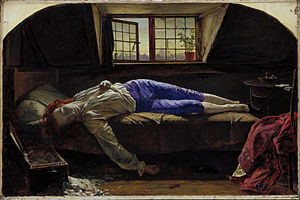The Gouler's Requiem
Thomas Chatterton 1752 (Bristol) – 1770 (Holborn)
Mie boolie entes, adiewe: ne more the syghte
Of guilden merke shalle mete mie joieous eyne;
Ne moe the sylver noble sheenynge bryghte,
Shalle fylle mie hande wythe weighte to speke ytte fyne;
Ne moe, ne moe, alas, I calle you myne;
Whyder must you, ah! whydder moste I goe?
I kenne not either! Oh mie emmers dygne,
To parte wythe you wyll wurche me myckle woe.
I must begon, butte where I dare nott telle,
O storthe unto mie mynde! I goe to helle.
Soone as the morne dyd dyghte the roddie sunne,
A shade of theves eache streacke of lyghte dyd seeme;
Whan yn the Heaven full half hys course was ronne,
Eche styrrynge nayghbour dyd mie harte afleme;
Thie Losse, or quyck or slepe, was aie mie dreme;
For thee, O goulde, I did the lawe ycrase,
For thee I gotten or bie wiles or breme;
Ynn thee I all mie joie and goode dyd place;
Botte nowe to mee thie pleasaunce ys ne moe,
I kenne notte botte for thee I to the quede muste goe.
Font size:
Submitted on May 13, 2011
Modified on March 05, 2023
- 54 sec read
- 88 Views
Quick analysis:
| Scheme | ABABBCBCDDBEBEEFEFCC |
|---|---|
| Closest metre | Iambic hexameter |
| Characters | 916 |
| Words | 182 |
| Stanzas | 1 |
| Stanza Lengths | 20 |
Translation
Find a translation for this poem in other languages:
Select another language:
- - Select -
- 简体中文 (Chinese - Simplified)
- 繁體中文 (Chinese - Traditional)
- Español (Spanish)
- Esperanto (Esperanto)
- 日本語 (Japanese)
- Português (Portuguese)
- Deutsch (German)
- العربية (Arabic)
- Français (French)
- Русский (Russian)
- ಕನ್ನಡ (Kannada)
- 한국어 (Korean)
- עברית (Hebrew)
- Gaeilge (Irish)
- Українська (Ukrainian)
- اردو (Urdu)
- Magyar (Hungarian)
- मानक हिन्दी (Hindi)
- Indonesia (Indonesian)
- Italiano (Italian)
- தமிழ் (Tamil)
- Türkçe (Turkish)
- తెలుగు (Telugu)
- ภาษาไทย (Thai)
- Tiếng Việt (Vietnamese)
- Čeština (Czech)
- Polski (Polish)
- Bahasa Indonesia (Indonesian)
- Românește (Romanian)
- Nederlands (Dutch)
- Ελληνικά (Greek)
- Latinum (Latin)
- Svenska (Swedish)
- Dansk (Danish)
- Suomi (Finnish)
- فارسی (Persian)
- ייִדיש (Yiddish)
- հայերեն (Armenian)
- Norsk (Norwegian)
- English (English)
Citation
Use the citation below to add this poem to your bibliography:
Style:MLAChicagoAPA
"The Gouler's Requiem" Poetry.com. STANDS4 LLC, 2024. Web. 24 Apr. 2024. <https://www.poetry.com/poem/36235/the-gouler's-requiem>.



Discuss the poem The Gouler's Requiem with the community...
Report Comment
We're doing our best to make sure our content is useful, accurate and safe.
If by any chance you spot an inappropriate comment while navigating through our website please use this form to let us know, and we'll take care of it shortly.
Attachment
You need to be logged in to favorite.
Log In